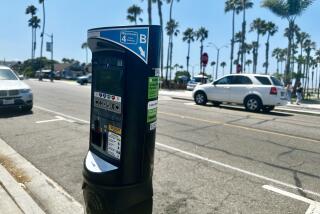Mysterious charges on your wireless bill? Beware of dead ringers
If you’ve spotted a mysterious $9.99 charge on your wireless bill for something called AVL Marketing, you’re not the only one apparently being scammed.
So is AVL Marketing.
“It’s not us,” said Tracy Sigler, founder of the small, North Carolina-based marketing firm and former vice president of Web operations for the financial news site the Motley Fool. “We’re really angry about this. We’ve gotten hundreds of calls.”
Stealing the identity of a legitimate company is the latest twist in a techno-racket that’s bedeviled cellphone users pretty much since the invention of the text message. Suddenly texts start spilling into your phone, followed by recurring charges on your bill for a service you never ordered.
The problem is: It’s all too easy for these fly-by-night texters to pass along charges through legitimate phone companies like AT&T and Verizon. Stronger protections for wireless customers are clearly needed. More on that in a moment.
First, Bob Carter is typical of many wireless customers who have gotten caught in this trap. Carter, 55, works as director of human resources for the Huntington Library in San Marino.
He recently noticed some unusual texts arriving on his AT&T iPhone. The first said he had an unread message from a “secret crush.” Carter ignored it.
Then he received a pair of texts from something called Guessology.com offering new ring tones. Next came a text asking whether Justin Bieber will soon be forming a boy band.
“That’s when I finally texted them to stop,” Carter said.
I know: I’m as surprised as you are that a senior official at the prestigious Huntington Library is uninterested in Bieber’s boy-band ambitions. Be that as it may, Carter thought he was done with the problem.
Nope.
Checking his most recent AT&T bill, Carter saw he was being billed $9.99 from AVL Marketing for “mobile health alerts.”
“I didn’t sign up for this or anything else,” he said. “I only use text messages to stay in touch with my family.”
Carter called AT&T. A service rep, he said, immediately agreed to cancel the charges, no questions asked. That was nice.
“But then he spun right into a hard-sell pitch for AT&T’s U-verse services,” Carter said. “It was weird. It made me wonder if AT&T and these texting companies were in on this together.”
The answer to that is no. But phone companies routinely levy charges from third parties until a customer raises a stink.
“We have millions and millions of third-party transactions every hour and every day,” said Lane Kasselman, an AT&T spokesman. “Most of them are legitimate.”
Here’s how it works: Third-party businesses seek the services of middle men known as aggregators. These aggregators in turn pass along charges to phone companies, which place them on people’s bills without first checking their authenticity. (The carriers say they don’t get a cut of these charges.)
A year ago, state regulators voted to crack down on unexpected fees popping up on people’s bills — a practice known in telecom circles as “cramming” — by requiring phone companies to investigate disputed transactions and to refund all unauthorized charges.
Kasselman said what likely happened in Carter’s case was that the AT&T service rep fulfilled his regulatory requirement of canceling the charges and then jumped right into a sales pitch for other services.
“When someone calls in, we want to offer products and services that people might be interested in,” he said.
That’s another way of saying that AT&T won’t let you go without trying to sell you something. Business is business.
But what you should keep in mind is that all phone companies will allow you to stop charges from third parties from getting on your bill — and you can do it for free. Just contact your wireless provider and ask for third-party blocking.
Why this isn’t the default setting I can’t say. Seems to me that cellphone users should be able to opt in to receiving third-party charges if they so choose, not have to opt out.
That’s why I advocate a more foolproof system to battle crammers: Require phone companies to seek a customer’s permission before a third party can place a charge on your bill.
This could be as simple as the phone company sending an email or text message alerting the customer that a third-party charge is in the works. The customer could then accept or reject the charge before any money is actually on the line.
Voila — no more cramming.
This would also protect companies like AVL Marketing, which would no longer find themselves in the middle of someone else’s text message scam.
As the complaints keep pouring in, AVL’s Sigler said, the company has had to convince law enforcement authorities nationwide that it’s not to blame for the rash of bogus charges.
In Carter’s case, he hasn’t received any more Bieber-related texts. But the other day he got a message from something called VIPatmSite.org, which was offering “some quick cash for bills and expenses.”
He sent them a text asking them to stop sending him messages.
Good luck with that.
David Lazarus’ column runs Tuesdays and Fridays. He also can be seen daily on KTLA-TV Channel 5. Send your tips or feedback to david.lazarus@latimes.com.
More to Read
Inside the business of entertainment
The Wide Shot brings you news, analysis and insights on everything from streaming wars to production — and what it all means for the future.
You may occasionally receive promotional content from the Los Angeles Times.









